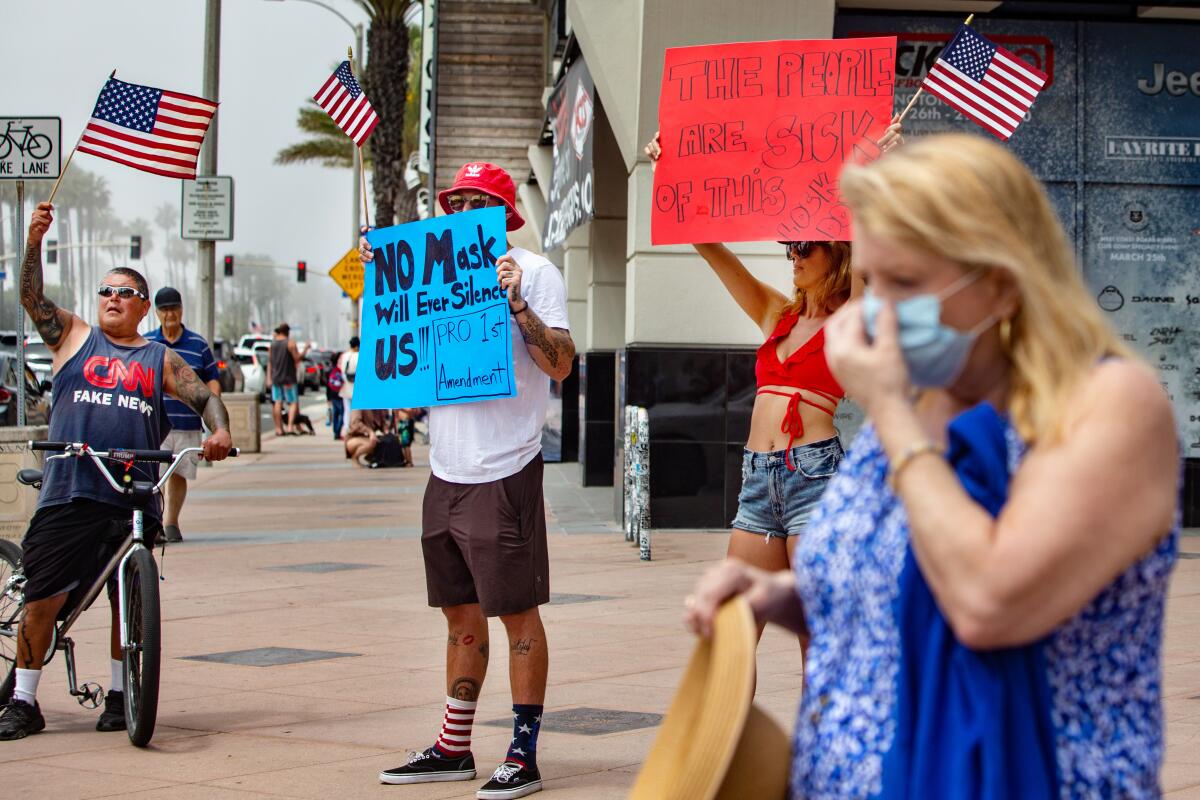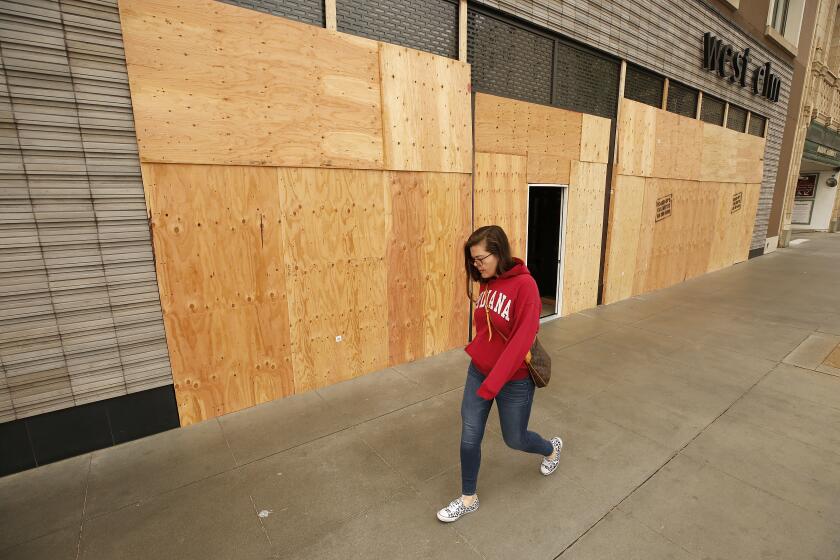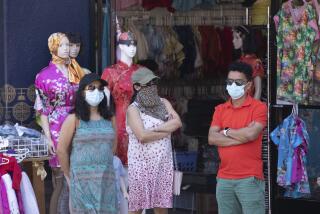Op-Ed: State lockdowns have become politically divisive. Here’s how we can come together

- Share via
Americans are in the midst of a moral dilemma as stark as any in the Bible. If we end the lockdown, deaths from COVID-19 will increase, but if we maintain it, the astounding unemployment rate will move still higher.
The problem would be tragic enough, but now it’s become politicized and has further divided Americans. Research on how people think about dire choices may help governors bring us together on this issue.
In one sense, the choice ought to be easy, because preserving life is what psychologists call a “sacred value.” Sacred values are not simply important, they are nonnegotiable — a human life is considered priceless — and people angrily condemn those who say otherwise.
In an experiment testing this value, subjects read about a hospital administrator who had to choose between spending a million dollars either on a life-saving operation for a child or on salary raises to ensure the best doctors stayed at the hospital. Subjects were outraged if the story described the administrator as considering the raises, even if he ultimately made the right choice. Similar outrage was directed at an Antioch, Calif., city planning commissioner last week when he suggested that the elderly and the homeless should be left to die in the pandemic, given that they are a drain on society.
It might seem, then, that Americans will support extreme measures, including an indefinite lockdown, to save lives. But the situation became more complicated when demonstrators in Michigan, California and other states framed the argument to end the coronavirus quarantine as a matter of “liberty” on the logic that each of us has the right to live as we wish, even at the risk of contracting COVID-19. That doubtless strikes some as mere rhetoric, but liberty is, for many Americans, a sacred value. “Give me liberty or give me death!” is invoked with patriotic admiration, not ridicule.
What happens when sacred values — human life and liberty — are pitted against each other?
People usually view a clash of sacred values as tragic. When researchers changed the hospital administrator story so that an organ-donor shortage caused him to have to choose which of two children’s lives to save, subjects felt pathos, not anger. So did Americans when they heard stories of Italian doctors forced to ration life-saving ventilators among extremely ill COVID-19 patients.
The governor said bookstores, florists and others can reopen for pickup as early as Friday. More detailed guidelines will be released later this week.
Why, then, is the question of when and how to relax the lockdown not evoking pathos, but anger? Partly because defenders of each value claim that the other value is not really threatened. People who want to extend the lockdown aren’t focused on the dire costs of economic downturns, such as increases in substance abuse and suicides; they are ridiculing protesters who are upset they can’t get a haircut.
Likewise, those who want to end the lockdown don’t trivialize the sacred value that’s getting in their way (human life) but instead suggest it’s not threatened; they compare COVID-19 to seasonal influenza, or they suggest that “amazing” medications are at hand.
In addition to belittling the opposing position, we are likely to overlook times we violate our own sacred values. Americans may say they cherish life, yet we do, as a society, tolerate deaths for economic reasons; surely Medicare and the Veterans Affairs hospital system could save more lives if they were better funded. We even tolerate deaths to protect trivial pleasures. For example, there’s no law against eating raw oysters, even though the practice kills about 100 people each year.
Likewise, Americans say they love liberty, but they don’t protest the numerous impositions on their freedom meant to protect their safety, including donning a helmet before riding a bicycle or removing shoes to deal with heightened security at airports.
The fact that people trivialize others’ points of view and overlook their own hypocrisy helps explain why people are so angry over the quarantine. But governors won’t bring their constituents together by calling them out for their inconsistencies. What’s a better strategy?
Research shows that when constituencies conflict around sacred values, anger can be reduced if each side shows some willingness to sacrifice. Consider an experiment testing Israeli West Bank settlers and Palestinian students, majorities of whom said they would never negotiate on their sacred values (yielding West Banks lands, and sovereignty over Jerusalem, respectively), even for the sake of peace. Researchers found that suggesting cash settlements as part of a peace deal prompted outrage. But a suggestion that the opposing side would yield on a matter touching their sacred value defused anger and made people more open to negotiation.
Governors can bring Americans together by showing that all values — life, liberty and economic security — matter. To satisfy those who feel their liberty (and the economy) are compromised, governors should redouble their efforts for aggressive testing, so that the quarantine can apply only to those who really need it. To address those concerned about potential loss of life, governors should support vigorous quarantine laws for the sick with actual consequences for violators, as well as the tracking of contacts.
Gov. Gavin Newsom’s plan to reopen California in phases, beginning this week, offers a useful model for other states. Localities will have increased authority to set their own pace, but they must demonstrate capacity in testing and contact-tracing to move forward.
The pandemic has wreaked havoc on virtually every aspect of American life. We can at least seek to protect our regard for one another.
Daniel T. Willingham is a professor in the department of psychology at the University of Virginia.
More to Read
A cure for the common opinion
Get thought-provoking perspectives with our weekly newsletter.
You may occasionally receive promotional content from the Los Angeles Times.











